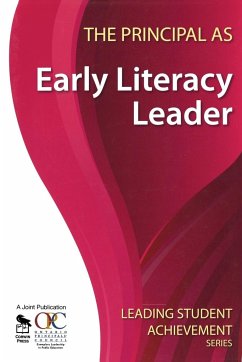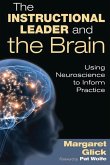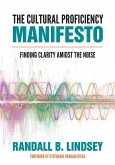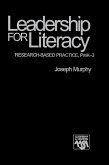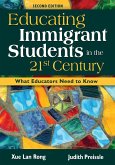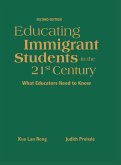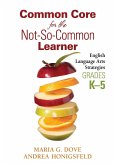Ontario Principals' Council
The Principal as Early Literacy Leader
Ontario Principals' Council
The Principal as Early Literacy Leader
- Broschiertes Buch
- Merkliste
- Auf die Merkliste
- Bewerten Bewerten
- Teilen
- Produkt teilen
- Produkterinnerung
- Produkterinnerung
This resource presents an overview of how three-, four-, and five-year-olds learn to read and shows school leaders how to implement and support quality early literacy programs.
Andere Kunden interessierten sich auch für
![The Instructional Leader and the Brain The Instructional Leader and the Brain]() Margaret GlickThe Instructional Leader and the Brain41,99 €
Margaret GlickThe Instructional Leader and the Brain41,99 €![The Cultural Proficiency Manifesto The Cultural Proficiency Manifesto]() Randall B. LindseyThe Cultural Proficiency Manifesto22,99 €
Randall B. LindseyThe Cultural Proficiency Manifesto22,99 €![Leadership for Literacy Leadership for Literacy]() Joseph MurphyLeadership for Literacy81,99 €
Joseph MurphyLeadership for Literacy81,99 €![Educating Immigrant Students in the 21st Century Educating Immigrant Students in the 21st Century]() Xue Lan RongEducating Immigrant Students in the 21st Century44,99 €
Xue Lan RongEducating Immigrant Students in the 21st Century44,99 €![Educating Immigrant Students in the 21st Century Educating Immigrant Students in the 21st Century]() Xue Lan RongEducating Immigrant Students in the 21st Century96,99 €
Xue Lan RongEducating Immigrant Students in the 21st Century96,99 €![Common Core for the Not-So-Common Learner, Grades K-5 Common Core for the Not-So-Common Learner, Grades K-5]() Maria G. DoveCommon Core for the Not-So-Common Learner, Grades K-532,99 €
Maria G. DoveCommon Core for the Not-So-Common Learner, Grades K-532,99 €![Integrating the Curricula Integrating the Curricula]() Robin J. FogartyIntegrating the Curricula39,99 €
Robin J. FogartyIntegrating the Curricula39,99 €-
-
-
This resource presents an overview of how three-, four-, and five-year-olds learn to read and shows school leaders how to implement and support quality early literacy programs.
Hinweis: Dieser Artikel kann nur an eine deutsche Lieferadresse ausgeliefert werden.
Hinweis: Dieser Artikel kann nur an eine deutsche Lieferadresse ausgeliefert werden.
Produktdetails
- Produktdetails
- Verlag: Corwin
- Seitenzahl: 160
- Erscheinungstermin: 3. Dezember 2008
- Englisch
- Abmessung: 229mm x 152mm x 9mm
- Gewicht: 242g
- ISBN-13: 9781412963077
- ISBN-10: 1412963079
- Artikelnr.: 25051495
- Herstellerkennzeichnung
- Libri GmbH
- Europaallee 1
- 36244 Bad Hersfeld
- gpsr@libri.de
- Verlag: Corwin
- Seitenzahl: 160
- Erscheinungstermin: 3. Dezember 2008
- Englisch
- Abmessung: 229mm x 152mm x 9mm
- Gewicht: 242g
- ISBN-13: 9781412963077
- ISBN-10: 1412963079
- Artikelnr.: 25051495
- Herstellerkennzeichnung
- Libri GmbH
- Europaallee 1
- 36244 Bad Hersfeld
- gpsr@libri.de
Acknowledgments Introduction 1. What Every School Leader Needs to Know About How Young Children Learn Differently Young Children Learn...Differently Play: A Window Into Children
s Learning Young Children Learning Language Through Social Interaction and Intellectual Play Language: The Early Framework for Later Thinking The Intellectual Behavior of Young Children Early Literacy: It
s More Than Sounds and Letters 2. What We Know Makes the Difference Transforming the Culture: The Role of the School Leader Assessing Program: One Size Does Not Fit All Recognizing Teacher Perception: Think They Will or Think They Won
t, Yoüre Right! Developing the Early Dispositions to Be Readers, Writers, and Critical Thinkers Creating the Conditions for Literacy: Six Ts for Exemplary Teaching Developing an Inclusive Literate Community: Providing One-on-one Support Through Multi-Age Buddies Strategizing for a More Flexible Curriculum Defining the Teacher
s Role Developing Literate-Rich Environments at School Building Partnerships With Parents Early Identification Processes 3. Instructional Leadership: The Tools You Will Need Developing a Vision: Changing Cultures Guiding Principles Defining Literacy: Three Key Expectations Assessing Learning: What Counts as Evidence? Management by Walking Around and What to Look For Planning Models Re-Conceptualizing Traditional Unit Plans Timetables Communication With Parents 4. Continuous Improvement: The Next Steps Creating Professional Learning Conversations Setting SMART Goals Evidence-Based Decision Making Teacher
s Professional Development Conclusion Glossary Tools for School Leaders Must Reads References Index
s Learning Young Children Learning Language Through Social Interaction and Intellectual Play Language: The Early Framework for Later Thinking The Intellectual Behavior of Young Children Early Literacy: It
s More Than Sounds and Letters 2. What We Know Makes the Difference Transforming the Culture: The Role of the School Leader Assessing Program: One Size Does Not Fit All Recognizing Teacher Perception: Think They Will or Think They Won
t, Yoüre Right! Developing the Early Dispositions to Be Readers, Writers, and Critical Thinkers Creating the Conditions for Literacy: Six Ts for Exemplary Teaching Developing an Inclusive Literate Community: Providing One-on-one Support Through Multi-Age Buddies Strategizing for a More Flexible Curriculum Defining the Teacher
s Role Developing Literate-Rich Environments at School Building Partnerships With Parents Early Identification Processes 3. Instructional Leadership: The Tools You Will Need Developing a Vision: Changing Cultures Guiding Principles Defining Literacy: Three Key Expectations Assessing Learning: What Counts as Evidence? Management by Walking Around and What to Look For Planning Models Re-Conceptualizing Traditional Unit Plans Timetables Communication With Parents 4. Continuous Improvement: The Next Steps Creating Professional Learning Conversations Setting SMART Goals Evidence-Based Decision Making Teacher
s Professional Development Conclusion Glossary Tools for School Leaders Must Reads References Index
Acknowledgments Introduction 1. What Every School Leader Needs to Know About How Young Children Learn Differently Young Children Learn...Differently Play: A Window Into Children
s Learning Young Children Learning Language Through Social Interaction and Intellectual Play Language: The Early Framework for Later Thinking The Intellectual Behavior of Young Children Early Literacy: It
s More Than Sounds and Letters 2. What We Know Makes the Difference Transforming the Culture: The Role of the School Leader Assessing Program: One Size Does Not Fit All Recognizing Teacher Perception: Think They Will or Think They Won
t, Yoüre Right! Developing the Early Dispositions to Be Readers, Writers, and Critical Thinkers Creating the Conditions for Literacy: Six Ts for Exemplary Teaching Developing an Inclusive Literate Community: Providing One-on-one Support Through Multi-Age Buddies Strategizing for a More Flexible Curriculum Defining the Teacher
s Role Developing Literate-Rich Environments at School Building Partnerships With Parents Early Identification Processes 3. Instructional Leadership: The Tools You Will Need Developing a Vision: Changing Cultures Guiding Principles Defining Literacy: Three Key Expectations Assessing Learning: What Counts as Evidence? Management by Walking Around and What to Look For Planning Models Re-Conceptualizing Traditional Unit Plans Timetables Communication With Parents 4. Continuous Improvement: The Next Steps Creating Professional Learning Conversations Setting SMART Goals Evidence-Based Decision Making Teacher
s Professional Development Conclusion Glossary Tools for School Leaders Must Reads References Index
s Learning Young Children Learning Language Through Social Interaction and Intellectual Play Language: The Early Framework for Later Thinking The Intellectual Behavior of Young Children Early Literacy: It
s More Than Sounds and Letters 2. What We Know Makes the Difference Transforming the Culture: The Role of the School Leader Assessing Program: One Size Does Not Fit All Recognizing Teacher Perception: Think They Will or Think They Won
t, Yoüre Right! Developing the Early Dispositions to Be Readers, Writers, and Critical Thinkers Creating the Conditions for Literacy: Six Ts for Exemplary Teaching Developing an Inclusive Literate Community: Providing One-on-one Support Through Multi-Age Buddies Strategizing for a More Flexible Curriculum Defining the Teacher
s Role Developing Literate-Rich Environments at School Building Partnerships With Parents Early Identification Processes 3. Instructional Leadership: The Tools You Will Need Developing a Vision: Changing Cultures Guiding Principles Defining Literacy: Three Key Expectations Assessing Learning: What Counts as Evidence? Management by Walking Around and What to Look For Planning Models Re-Conceptualizing Traditional Unit Plans Timetables Communication With Parents 4. Continuous Improvement: The Next Steps Creating Professional Learning Conversations Setting SMART Goals Evidence-Based Decision Making Teacher
s Professional Development Conclusion Glossary Tools for School Leaders Must Reads References Index

